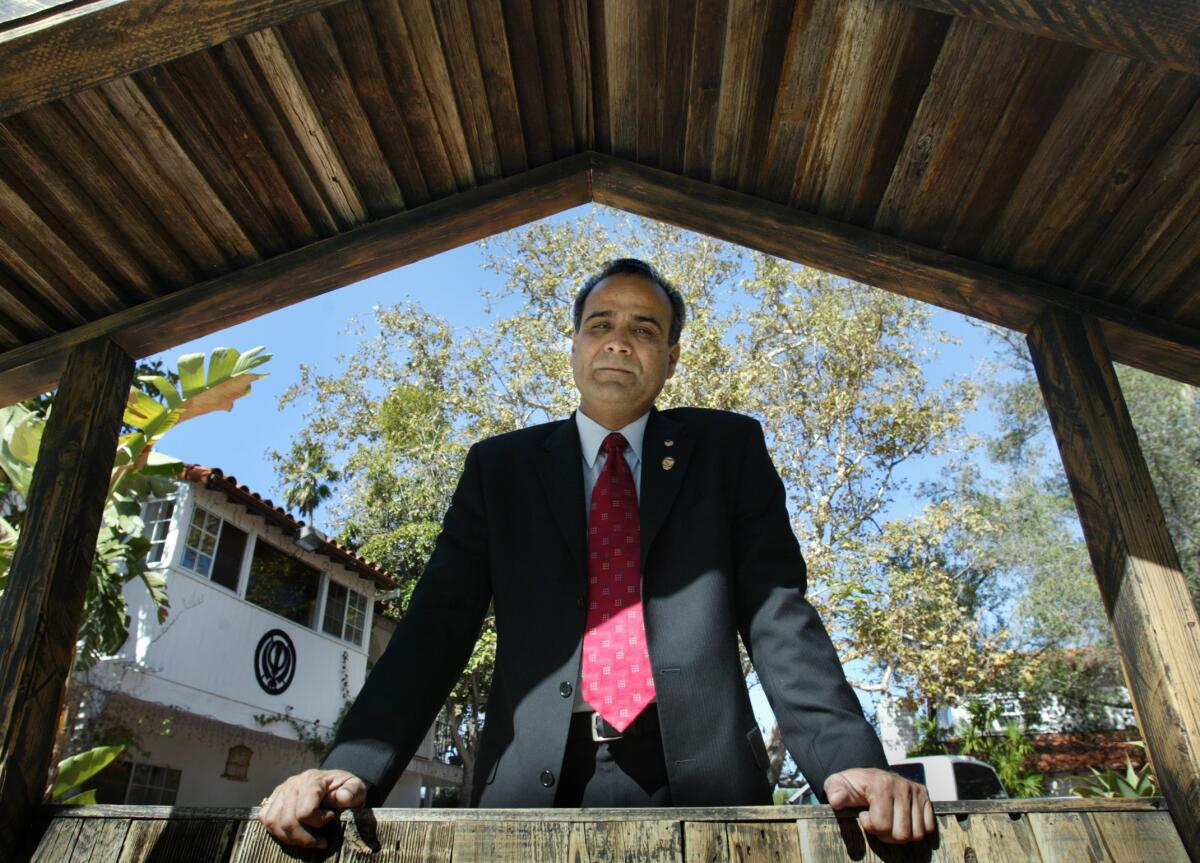23andMe bankruptcy leaves control of genetic data from millions in limbo

- Share via
Good morning, and welcome to the Essential California newsletter. It’s Sunday. I’m your host, Andrew J. Campa. Here’s what you need to know:
- Genetic data hang in the balance after 23andMe bankruptcy.
- Former Anaheim mayor sentenced to two months in federal prison in corruption.
- UCLA bans Students for Justice in Palestine as a campus organization.
- And here’s today’s e-newspaper.
Sign up for Essential California
The most important California stories and recommendations in your inbox every morning.
You may occasionally receive promotional content from the Los Angeles Times.
They wanted to learn about themselves. Now 23andMe customers worry others will take control of their genetic information
There were the cases that forced hard truths, such as what happened to Christina Snyder Monahan.
The Irvine resident received genetic results from a DNA test that showed she was around 50% Persian, though no one in her family was.
Then Monahan’s mother acknowledged an “encounter” with a man who was not her husband, but was Christina‘s biological father.
Such a revelation wouldn’t have been possible without 23andMe, the South San Francisco-based genetic testing company that allowed consumers to send in their DNA and receive valuable information.
Most of the results were not as dramatic, but confirmed family histories and, in many cases, provided vital medical information.
Now Monahan and roughly 15 million other customers are worried about their valuable and private genetic information after 23andMe declared bankruptcy.
My colleagues Caroline Petrow-Cohen and Stacy Perman reported on the future of that data.
A rising star’s downfall
The company was a comet — at one point valued at $6 billion — and was popular for its at-home saliva DNA test kits.
23andMe once held “spit parties,” where high-profile celebrity customers hocked into a tube to provide their DNA sample.
The samples helped people discover entirely new family trees and could reveal consequential health information, such as a genetic predisposition to cancer. The genetic data collected by services similar to 23andMe were used to catch the infamous Golden State Killer in 2018.
But after an initial surge in business, 23andMe struggled to attract repeat customers and failed to branch out into other venues. Eventually, internal company politics led to a Chapter 11 bankruptcy filing on March 23.
A bankruptcy court authorized the company to sell off its assets, including its database of genetic information.
The treasured DNA
The company’s online terms of service say, “Your sample is processed in an irreversible manner and cannot be returned to you. Any information derived from your sample remains subject to rights we retain as set forth in these Terms.”
“Genetic information is uniquely sensitive because it reveals immutable characteristics about ourselves,” Sara Geoghegan, senior counsel at the Electronic Privacy Information Center, told The Times recently. “I would be very concerned if I had given a swab to 23andMe. There is little we can do to control what happens to it.”
The state jumped in to warn consumers.
California Atty. Gen. Rob Bonta issued a consumer alert after the bankruptcy announcement to remind Californians of their right to have their genetic data deleted under the Genetic Information Privacy Act and the California Consumer Privacy Act.
Website crashes and promises
The 23andMe website crashed recently as customers deleted their data, the Wall Street Journal reported.
The company issued a statement clarifying that “potential buyers must, among other requirements, agree to comply with 23andMe’s consumer privacy policy and all applicable laws with respect to the treatment of customer data.”
A company spokesperson declined to comment for this article and referred to previous statements.
Past problems
A company data breach in 2023 affected nearly 7 million customers, and last year, 23andMe paid $30 million to settle a class-action lawsuit accusing the company of failing to protect its customers.
The level of risk 23andMe customers face now largely depends on who ends up buying the company, said Christo Wilson, a Northeastern University computer sciences professor who specializes in online privacy and data security.
“People should be worried,” he said. “There’s lots of different actors who would want this data for a lot of different purposes, far beyond what you probably thought you were consenting to when you were just interested in genealogy.”
What you can do
“The attorney general of California is suggesting that people delete their accounts and that is making me think twice,” Monahan said. “There might be danger lurking out there or repercussions.”
Customers can delete their account and request their samples be destroyed. They must log in and navigate to the settings page, where they can also withdraw permission for third-party researchers to use their data.
For more information on precautions or background, check out the full article.
The week’s biggest stories
Crime, courts and policing
- Former Anaheim mayor sentenced in Angel Stadium corruption probe.
- He sold Pablo Escobar-branded flamethrowers, phones and more. But it was all a scam, authorities say.
- After baby’s fentanyl overdose, L.A. prosecutors accuse mom and grandpa of murder.
- Murder charges filed after second woman killed during conjugal visit in California state prison.
- Catalytic converter thefts dropped 60% in Fresno after arrest of a single seller.
Los Angeles fires, rebuild and aftermath
- California suspends environmental laws to speed rebuilding of utilities after L.A. fires.
- In Altadena, RV dwellers live next to their homes, straddling burn zone and normalcy.
- Deadline to enroll in Army Corps’ fire debris cleanup extended; some multifamily housing now eligible.
- L.A. fire contaminant levels could sicken the marine food chain, new tests show.
- LAFD actions in Palisades fire shrouded in secrecy as city refuses to release records.
Trump administration policies and reactions
- ‘Inbox from hell’: Environmental groups outraged after EPA says polluters can email for exemptions.
- Newsom calls the Democratic brand ‘toxic’ as he defends his podcast.
- California principal blocks Border Patrol from participating in career fair; school district apologizes.
- LAist and KCRW leaders say loss of taxpayer funds could hurt local public radio.
- Owner of famed L.A. restaurant faces backlash after Elon Musk, Tesla comments.
More big stories
- What can JuJu Watkins expect after ACL tear? Paige Bueckers and others offer insight.
- Supermarket digital-only coupons are popular. Critics say they breed inequality and San Diego banned them.
- Six Flags Magic Mountain’s record-setting Superman coaster will fly no more.
- In-N-Out ends secret menu price hack — here’s the proof.
- What to do if you can’t pay the taxes you owe.
- U.S. is on an egg hunt in Europe to ease prices at home.
Get unlimited access to the Los Angeles Times. Subscribe here.
Column One
Column One is The Times’ home for narrative and long-form journalism. Here’s a great piece from this past week:
Tommy Lasorda had a lot of things to say, many of which still stick in our heads after all these decades. He exulted in the fruits of victory. He dubbed Dodger Stadium “Blue Heaven on Earth.” He warned you might not get into the real heaven if you did not root for the Dodgers. He also had a simple formula for success. “No matter how good you are, you’re going to lose one-third of your games,” Lasorda liked to say. “No matter how bad you are, you’re going to win one-third of your games. It’s the other third that makes the difference.”
More great reads
- Elderly, disabled were left stranded during L.A. fires as evacuation plans broke down
- 20 years and counting: How a chance encounter with a street musician led to a lasting bond.
- A pediatrician’s dilemma: Should a practice kick out unvaccinated kids?
- Opinion: It is not faith that divides us.
- Trump declared war on fentanyl traffickers. Is it what parents of overdose victims want?
How can we make this newsletter more useful? Send comments to [email protected].
For your weekend
Going out
- 🍴 Variety is great. But other times it’s best to go with the classics. In these 15 L.A. restaurants, ordering the house specialty is a must.
- ☕ For those wanting a little pep in their steps, we’ve got 14 nouveau L.A. cafes for a chic coffee or matcha break.
- 📽️ Our critic Robert Adele reviews “Being Maria,” a film about the infamous rape scene in the 1972 film “Last Tango in Paris.”
- 🛋️ Facials and BMWs that chauffeur you to your plane? How to get inside LAX’s luxury lounges.
- 🚶 3 incredible L.A. hikes to fill the void left by trails burned in the fires.
Staying in
- 💥 Director Ridley Scott wades into graphic novels alongside Jesse Negron to introduce “Modville.” Here’s our review.
- 🎳 Can’t stop, won’t stop. The legendary cartoon classic “The Simpsons,” returns for season No. 37 tonight.
- 🧑🍳 There’s something about a savory, hot and hearty bowl of lentil soup that hits the spot. Here’s our recipe.
- ✏️ Get our free daily crossword puzzle, Sudoku, word search and arcade games.
L.A. Affairs
Get wrapped up in tantalizing stories about dating, relationships and marriage.
He was a property manager from Philadelphia. She was a British journalist based in L.A. He was intent on remaining single, while she was on a mission to meet the right man and start a family. The fact he drove a pickup truck only added to the romantic allure. They dated and went everywhere in that blue truck, with her favorite trips heading up the Pacific Coast Highway to Malibu and Ojai. They wed, married and enjoyed life together, until cancer took him. The truck remained through good and bad times before it too broke down. Could she say goodbye again?
Have a great weekend, from the Essential California team
Andrew J. Campa, reporter
Monte Morin, assistant managing editor
Check our top stories, topics and the latest articles on latimes.com.
Sign up for Essential California
The most important California stories and recommendations in your inbox every morning.
You may occasionally receive promotional content from the Los Angeles Times.








